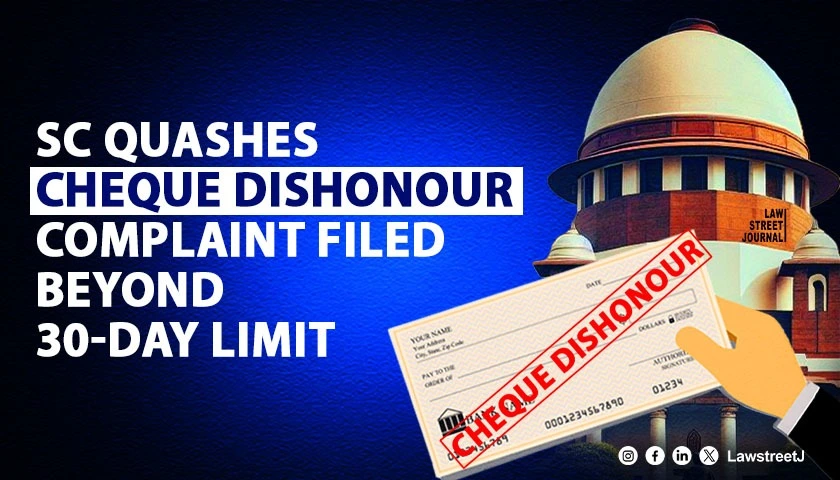New Delhi: The Supreme Court has quashed a complaint filed under the Negotiable Instruments Act, 1881, emphasizing that the 30-day timeline prescribed under Section 142(b) for filing cheque dishonour complaints is mandatory and cannot be automatically condoned without following due procedure.
A bench comprising Justice Ahsanuddin Amanullah and Justice K. Vinod Chandran delivered the judgment in Criminal Appeal arising from SLP (Crl.) No.2002/2025, titled H.S. Oberoi Buildtech Pvt. Ltd & Ors. vs. M/S MSN Woodtech, dated September 9, 2025.
The case arose when H.S. Oberoi Buildtech Pvt. Ltd, H.S. Oberoi, and Manveer Singh Oberoi challenged summons issued by the Trial Court in a case filed under Section 138 of the Negotiable Instruments Act. The Court noted, “The appellants have moved this Court against the order dated 21.11.2024 passed by the High Court, by which the order summoning the appellants by the courts below in a case filed under Section 138 of the Negotiable Instruments Act, 1881, has been upheld.”
The central issue was whether the Trial Court could issue summons when the petition was admittedly filed five days beyond the maximum 30-day period from the cause of action. The Court observed, “The simple point to be considered in the present case is whether the Trial Court could have issued summons when admittedly the petition under the Act was filed five days beyond the maximum period of 30 days from the cause of action.”
The appellants argued that while there is power to condone delay under the proviso to Section 142 of the Act, it must be exercised only upon a proper application filed by the complainant disclosing reasons for the delay. The Court noted that the Trial Court had erroneously stated that the petition was filed within the limitation period.
The respondent contended that the Court possessed inherent power to condone a brief delay of five days and that an affidavit seeking condonation had been prepared but inadvertently not filed with the complaint.
The Court, however, emphasized that delay cannot be condoned automatically or by presumption. It stated, “From a purely legal point of view, where the facts are admitted that the complaint was filed beyond the time prescribed under the statute, there cannot be an automatic or presumed condonation.”
The Supreme Court criticized both the Trial Court and High Court’s approach, observing, “In the present case, the respondent is on a weaker wicket for the reason that the Trial Court proceeded on an erroneous presumption and noted that the complaint was filed within the limitation period.”
The Court laid down clear procedural requirements, stating, “Even for the sake of argument, if it is assumed that the power under Section 142 of the Act exists for the Court to condone delay, the first requirement is that the Court has to take note of the fact that there is a delay, and thereafter it had to go on the point whether the reasons furnished by the complainant are sufficient to condone such delay.”
Rejecting the High Court’s view that filing an application for condonation is not statutorily mandated, the Supreme Court held, “Once the statute prescribes a mandatory time limit for filing a complaint, there cannot be any deviation from the same except when an application accompanying the complaint is filed, seeking condonation and disclosing reasons for the delay.”
The Court emphasized the judicial obligation in such cases, stating, “It is obligatory on the part of the Court to take note of such filing beyond limitation and to consider the reasons disclosed independently, and to come to a judicious conclusion that in the facts and circumstances of that case condonation is justified.”
Finding that proper procedure was not followed, the Supreme Court set aside the summons and quashed the complaint entirely. It ordered, “Accordingly, the order issuing summons to the appellants by the Trial Court, as upheld by the High Court, is set aside. In the result, the complaint itself stands quashed.”
However, the Court clarified that civil proceedings for recovery instituted by the respondent would not be prejudiced by this order, observing, “As civil recovery proceedings have already been instituted by the respondent, we observe that the same will not be prejudiced in any manner by the present order.”
Mr. Yugansh Mittal appeared as Advocate-on-Record for the petitioners along with Mr. Pawan K. Mittal, while Mr. Sudhir Tewatia, Mr. Lal Singh Thakur, Mr. Syed Mehdi Imam (AOR), Mr. Tabrez Ahmad, and Mr. Shahid Ali Khan appeared for the respondent.
Case Title: H.S. Oberoi Buildtech Pvt. Ltd & Ors. vs. M/S MSN Woodtech













